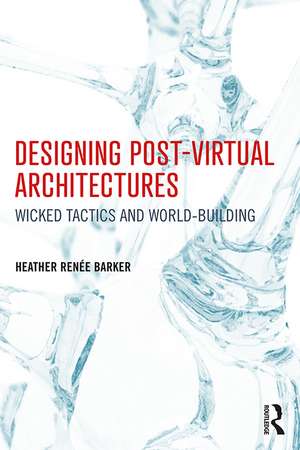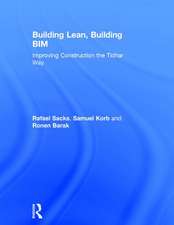Designing Post-Virtual Architectures: Wicked Tactics and World-Building
Autor Heather Barkeren Limba Engleză Hardback – 2 dec 2019
With this book as a resource, architects and designers have a handbook of technical and philosophical concepts to lend rigor to their design work. Numerous diagrams delineate complex ideas while also acting as templates for creating, assessing, and communicating the meaning and value of designed solutions. As a handbook, the intention is to provide a guide to support the application of interdisciplinary tactics across strategic fields. Such novel approaches open up new ways of developing singular solutions and new ways to serve the distributed behaviours systemized through architectures. In an evolving contemporary condition, a foundation of rigorous human-centred design is central to moving the discipline of design into the future.
Providing a range of rigorous methodologies for those looking to develop project-specific strategies, Designing Post-Virtual Architectures: Wicked Tactics and World-Building is a tool to facilitate the creation of innovative and meaningful architectures, and is an ideal resource for postgraduate students of architectural theory, design theory and design methods, as well as academics and professionals practicing the field.
| Toate formatele și edițiile | Preț | Express |
|---|---|---|
| Paperback (1) | 382.75 lei 6-8 săpt. | |
| Taylor & Francis – 2 dec 2019 | 382.75 lei 6-8 săpt. | |
| Hardback (1) | 999.46 lei 6-8 săpt. | |
| Taylor & Francis – 2 dec 2019 | 999.46 lei 6-8 săpt. |
Preț: 999.46 lei
Preț vechi: 1218.86 lei
-18% Nou
Puncte Express: 1499
Preț estimativ în valută:
191.24€ • 200.21$ • 158.24£
191.24€ • 200.21$ • 158.24£
Carte tipărită la comandă
Livrare economică 05-19 aprilie
Preluare comenzi: 021 569.72.76
Specificații
ISBN-13: 9781138639966
ISBN-10: 1138639966
Pagini: 208
Ilustrații: 172
Dimensiuni: 152 x 229 x 18 mm
Greutate: 0.43 kg
Ediția:1
Editura: Taylor & Francis
Colecția Routledge
Locul publicării:Oxford, United Kingdom
ISBN-10: 1138639966
Pagini: 208
Ilustrații: 172
Dimensiuni: 152 x 229 x 18 mm
Greutate: 0.43 kg
Ediția:1
Editura: Taylor & Francis
Colecția Routledge
Locul publicării:Oxford, United Kingdom
Public țintă
PostgraduateCuprins
Introduction - "How exactly, do I design?"
Pillar 01 – Discover / Epoché
Terminology (lexis) of human-centered design practice.
Introduction
Language is Code and Language is Strategy.
DISCOVER
Behavioral Science / Biology / Physics
Experience / Perception / Science Fiction / Space
Define
Artificial Intelligence / Learning Theory
Complexity Theory / Game Theory
Film Theory / Linguistics / Semiotics
Develop
Anthropology / Sociology
Mathematics / Philosophy / Poetry
Deliver
Architecture / Computer Science
Design / Design Thinking / Strategy
Pillar 02 – Define / Phenomenological Reduction
Methodologies that define design practice.
Introduction
Building Methodologies:
Experience Design / Process Constructive (XD/PC) Theoretical Framework
Pragma-Phenome Theory Statement
Pillars of the Applied Experience Design / Process Constructive Theoretical Framework
Design Assets, Value Creation and Evaluation Criteria
Semantic Consistency and Alignment between Theory and Strategy
Development of the Methodologies
Applying the XD/PC Methodologies
Methodologies under the Pragma-Phenome Umbrella
Choose your own methodology
Consistent across all methodologies: Building the Data Space
Gamification as a Pragmatic Measure of Engagement
From Philosophy to Project
Engage In A World-Building Design Methodology
World-Building Methodology For Big, General, Undefined Issues
Engage In A Soft Systems Design Methodology
Emphasis On Systems.
Engage In An Imagist Design Methodology
Emphasis On Value.
Engage In A Pragmatist Design Methodology
Emphasis On Objects & Action.
Four Phases of the Pragma-Phenome Design Process Methodologies.
Self-Similar Phases of the Pragma-Phenome Design Process Methodologies.
Phase 01 Discover & Analyze – Epoché
Phase 02 Define & Contextualize – Phenomenological Reduction
Phase 03 Develop & Implement – Eidetic Variation
Phase 04 Deliver & Measure – Intersubjective Corroboration
Summary of Methodologies
Systemized Processes of Design Praxis
Pillar 03 – Develop / Eidetic Variation
Abstracted Principles, Generalized, and Prototyped in Practice
Case-Studies
Introduction
Methodologies as Applied to Case-Studies
World-Building Methodology (Space for Everyone Virgin Orbit)
Soft Systems Design Methodology (Urban Public Safety)
Imagist Methodology (Mobility: MC2 / 2028 Olympics / Toyota)
Pillar 01 – Discover / Epoché
Terminology (lexis) of human-centered design practice.
Introduction
Language is Code and Language is Strategy.
DISCOVER
Behavioral Science / Biology / Physics
Experience / Perception / Science Fiction / Space
Define
Artificial Intelligence / Learning Theory
Complexity Theory / Game Theory
Film Theory / Linguistics / Semiotics
Develop
Anthropology / Sociology
Mathematics / Philosophy / Poetry
Deliver
Architecture / Computer Science
Design / Design Thinking / Strategy
Pillar 02 – Define / Phenomenological Reduction
Methodologies that define design practice.
Introduction
Building Methodologies:
Experience Design / Process Constructive (XD/PC) Theoretical Framework
Pragma-Phenome Theory Statement
Pillars of the Applied Experience Design / Process Constructive Theoretical Framework
Design Assets, Value Creation and Evaluation Criteria
Semantic Consistency and Alignment between Theory and Strategy
Development of the Methodologies
Applying the XD/PC Methodologies
Methodologies under the Pragma-Phenome Umbrella
Choose your own methodology
Consistent across all methodologies: Building the Data Space
Gamification as a Pragmatic Measure of Engagement
From Philosophy to Project
Engage In A World-Building Design Methodology
World-Building Methodology For Big, General, Undefined Issues
Engage In A Soft Systems Design Methodology
Emphasis On Systems.
Engage In An Imagist Design Methodology
Emphasis On Value.
Engage In A Pragmatist Design Methodology
Emphasis On Objects & Action.
Four Phases of the Pragma-Phenome Design Process Methodologies.
Self-Similar Phases of the Pragma-Phenome Design Process Methodologies.
Phase 01 Discover & Analyze – Epoché
Phase 02 Define & Contextualize – Phenomenological Reduction
Phase 03 Develop & Implement – Eidetic Variation
Phase 04 Deliver & Measure – Intersubjective Corroboration
Summary of Methodologies
Systemized Processes of Design Praxis
Pillar 03 – Develop / Eidetic Variation
Abstracted Principles, Generalized, and Prototyped in Practice
Case-Studies
Introduction
Methodologies as Applied to Case-Studies
World-Building Methodology (Space for Everyone Virgin Orbit)
Soft Systems Design Methodology (Urban Public Safety)
Imagist Methodology (Mobility: MC2 / 2028 Olympics / Toyota)
Notă biografică
Heather Renée Barker, Associate Professor of Design at California State University Long Beach, USA develops her work through the integration of research and practice. She is founding coordinator of the graduate Human Experience Design Interactions (MA_HXDI) program and the Immersive Design Research Lab and has served the city of Long Beach, California as Design Lead for the Bloomberg Philanthropies’ funded Innovation Team (i-team) and as Design Strategy Lead for the Office of Civic Innovation.
Recenzii
"We live in an era where advances in technology and changes in global social paradigms collide. Inspired by philosophical insights and drawing from methodologies across a wide spectrum of professional practices, Designing Post-Virtual Architectures sets forth necessary design frameworks to solve the wicked challenges for the modern age and beyond."
—Jonathan Lo
Creative Director, Virgin Orbit
“Heather Renee Barker is the embodiment of innovation—leveraging the practice of design to inform and transform the practice of public policy in the City of Long Beach. This book is a must read for practitioners—no matter the sector—who wish to improve user experience (from ground-up) and who seek breakthroughs in their life’s work.”
—John Keisler, MPA
City of Long Beach Director of Economic Development
—Jonathan Lo
Creative Director, Virgin Orbit
“Heather Renee Barker is the embodiment of innovation—leveraging the practice of design to inform and transform the practice of public policy in the City of Long Beach. This book is a must read for practitioners—no matter the sector—who wish to improve user experience (from ground-up) and who seek breakthroughs in their life’s work.”
—John Keisler, MPA
City of Long Beach Director of Economic Development
Descriere
With this book as a resource, architects and designers have a handbook of technical and philosophical concepts to lend rigor to their design work.

















